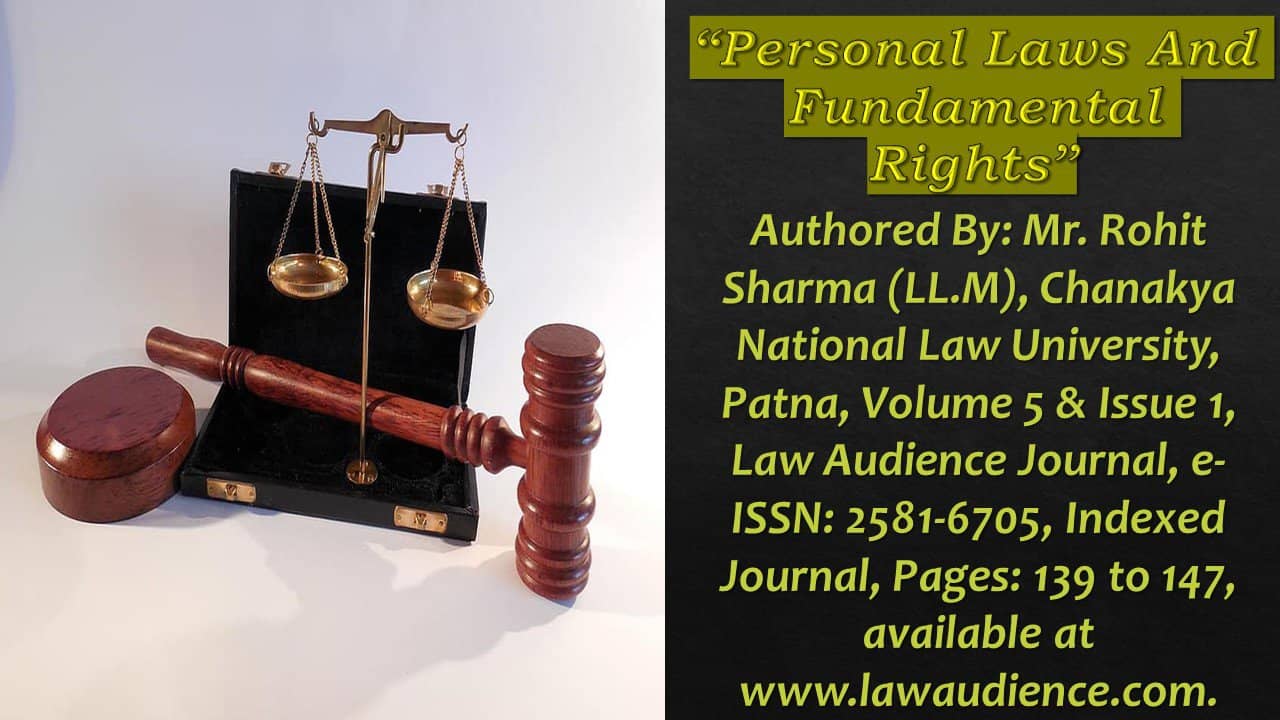Click here to download the full paper (PDF)
Authored By: Mr. Rohit Sharma (LL.M), Chanakya National Law University, Patna,
Click here for Copyright Policy.
I. INTRODUCTION:
Personal laws date back to pre-colonial times. In fact, parts of it were translated, altered, and anglicized for dominance by the Brits. They frequently have religious rules governing inheritance, succession, marriage, divorce, and so forth. They are deemed unchanging since their authority originates from the religion itself. These became a topic of dispute during the Constituent Assembly Discussions after independence, though.
According to the Second Law Commission report (1958-61):
“A British legislature cannot make Hindu or Mohammedan religion, therefore neither can they make Hindu or Mohammedan law.”[1] Even the rule of evidence and crimes were governed by Mohammedan law during the British regime, which was unclear and irrational. Women, for example, were qualified witnesses under Islam Law but had little credibility. That is why the British began codifying laws, reducing the scope of personal laws in India. Although though the British first avoided interfering with personal laws, they finally did. They devised standards to promote consistency to colonial rule-making. In his famous speech, Lord Macaulay declared, “Our principle is simply this-uniformity where you can have it-diversity where you must have it-but certainty in all circumstances.”[2] Yet, even after seventy-five years of independence, India’s personal laws have not been sufficiently amended to assure equality and non-discrimination. The biggest difficulty is the absence of personal legislation in the Constitution, which is frequently dealt separately, sometimes undermining and defeating fundamental rights. Because of religious variety, personal laws create uncertainty and ambiguity. Nonetheless, despite their differences in statutory terminology, they are somewhat comparable in terms of discriminating against or subjugating women. Discrimination against women in many personal laws violate the fundamental framework of the Constitution. Furthermore, such discriminatory policies have been justified in the name of religion. Polygamous marriage and extra-judicial divorce are grounds for discrimination under Muslim law. According to Hindu Law, restitution of conjugal rights or pre-act polygamous marriages are harmful to women. These laws demonstrate that women are viewed as husbands’ gifts. As a result, the patriarchal structure of society worsens women’s conditions. It is past time to extend the benefits of constitutional provisions to women in their genuine essence and spirit, which are frequently thwarted by personal laws. According to this article, India should be ruled by the Constitution rather than by discriminatory personal laws. Some natural human rights are inherent and inalienable, regardless of religion.[3] As a result, we must reconsider the notion of non-interference in personal laws in India. This legislation should be scrutinized fairly in light of fundamental rights criteria.
II. PERSONAL LAWS JURISPRUDENTIAL ASPECTS IN INDIA:
To grasp the broad applicability of fundamental rights over personal laws, consider Article 13(1) and the concept of ‘law’.
Sir John Salmond had stated in this regard.
‘Law is the corpus of principles that the state applies to administer justice through enactment or recognition’.[4] As a result, one could claim that non-statutory laws that were still enforced by courts over time gained ‘force of law’. As a result, even non-statutory personal laws can be regarded ‘law in force’. As a result, they must also adhere to fundamental rights.[5] Personal laws, according to eminent jurist H.M. Seervai, could be called “existing law” or “law in force” due to their applicability in court proceedings. His claim was based on Entry-5 (List-III).[6] Entry-5 empowers respective governments to regulate personal law problems such as succession, inheritance, divorce, and so on. Yet, he also stated that personal laws, conventions, and usage are intricately linked, making it difficult to distinguish them based on need. Therefore, Article 44 and the Directive Principles of State Policy (DPSP)[7] cannot be completely ignored. When fundamental rights and the DPSP are coupled, the true character and spirit of the Indian Constitution shine through. Everyone recognises the significance of fundamental rights. DPSPs, on the other hand, are held in lower regard than the former.[8] Jurists such as B.N Rau and Granville Austin argued that DPSPs were revolutionary in Indian society.
According to Austin, the DPSP under Part IV of the Constitution might bring about revolutionary transformations.[9] Hence, enacting the Uniform Civil Code[10] will mark a watershed moment in the transition from ancient religious norms to projected gender-neutral legislation. Numerous prominent Indian legal figures, including Judge A.P. Shah and Justice K.T. Thomas, have explicitly stated the need for UCC. They further argued that such reforms should not limit individuals’ right to profess and promote their religion, as guaranteed by Articles 25-28.[11] It is incorrect to imply that Indian courts overlooked common law’s relevance in personal concerns. The Supreme Court was asked to reconsider its position on personal laws and the applicability of basic rights over them in Re, Smt. Amina vs. Unknown[12].
The SC places customary laws under Art. 13 but not personal laws that derive their force from local norms. As a result, in this case, the SC was advised to evaluate the legislative objective behind Art.13. A single-judge panel recognised discrimination under separate personal laws in Pannalal Bansilal Pitti & Ors. ETC. vs. State of Andhra Pradesh & Anr[13]. SC acknowledged the need of UCC but advised against implementing it all at once. It was agreed that before introducing UCC, we should first amend India’s personal laws. Yet, this reformation must adhere to UCC’s basic aims. The court observed in United Provinces versus Atiqua Begum[14], that the term ‘law in force’ under Section 292 of the Government of India Act[15] covers personal law as well. Therefore, the question is, what is preventing the Indian state from implementing this amendment under Article 372(2) and entry-5 of List-III? To their credit, the Indian judiciary and legislature have made some progress in repealing personal laws that violate women’s fundamental rights. For example, in Shah Bano Begum vs. Mohd. Ahmad Khan[16], the Supreme Court provided relief to Shah Bano by enforcing Section 125 of the Criminal Process Code[17]. Paragraph Part supplied her with sustenance by exceeding Muslim personal law. This is only one example of how our legal system balances and protects fundamental rights. The Law Commission of India[18] issued its 71st Report in 2018. It advocated for the preservation of Indian religious and cultural diversity. It stated: “cultural diversity cannot be sacrificed to the point that our desire for uniformity becomes a basis for a threat to the nation’s territorial integrity.” While the Law Commission’s Consultation Paper acknowledged the shortcomings of personal laws, it did not advocate for the implementation of UCC. It reasoned instead:
“By codifying many personal rules, one can arrive at certain universal principles that prioritise equity rather than imposing a uniform code, which would dissuade people from utilizing the law at all, given that marriage and divorce can also be settled extra-judicially.” Yet, Goa is an example of UCC implementation that does not jeopardise universality.[19] Even the Supreme Court recognised the same, citing the UT as ‘shining example of UCC’.
III. CONSTITUENT ASSEMBLY DEBATES ON PERSONAL LAWS IN INDIA:
As the Constitution was being made, the Constituent Assembly talked about how much the state should be able to rule on personal laws. The draught of Article-35 was the main topic of this debate (UCC). Most of the members didn’t want personal laws to be covered by fundamental rights. Some people even said that personal laws are not part of a “code.”[20] One of the things that was said was that a secular state like India shouldn’t try to control personal laws by writing them down. Many people were against codification because personal laws are tied to religious matters.[21] They said that people should be able to make their own decisions about personal laws. After the draught was brought to Article 35, UCC suddenly went up. Some people liked the idea of UCC because they thought that the differences in geography and culture would make it hard to apply personal laws in the same way everywhere.[22] Art. 19 and Art. 35 were changed because of these doubts. A clause was added that says the UCC doesn’t have to be followed by the people and that Art. 19 is subject to personal laws.[23] One idea was to write a clear rule into the Constitution. With this clause, the state would have to ask the religious community for permission before making any big changes to personal laws.[24] But this amendment started a fight about how much power the state has to make personal laws. So, the assembly didn’t agree with it.[25] Not everyone was against the idea of personal laws being made by the government. On the other hand, a number of people spoke up in favour of formal laws. For example, KM Munshi said that personal matters like inheritance, succession, divorce, etc. are not religious matters. So, the state should be in charge of personal laws so that the goals in the Preamble can be reached.[26] Dr. B.R. Ambedkar’s speech about the state’s power over personal laws shows that many members accepted the idea of parliamentary sovereignty even as the Hindu Code Bill was being worked out. So, Ambedkar was in some ways in favour of UCC, but he also knew that India wasn’t ready. He had said the following about this:
“No one needs to worry that if the government has the power, it will use it in a way that Muslims, Christians, or any other group in India might not like.” Since the Constituent Assembly was split at the time, UCC was added to the current Constitution, but under Art. 44 of the Directive Principle of State Policy. Thus, making it voluntary. Several members said that religious ideas used to guide people’s daily lives. As time went on, these religious ideas turned into personal laws. But the time has come to separate personal law from religious law so that it fits the needs of society right now. Gender inequality and personal laws in India: India’s international duty to promote gender equality. Customary international law says that a treaty that has been changed by a state is still legally binding. India has also signed the International Convention on Civil and Political Rights (1966)[27] and the International Convention on the Elimination of All Forms of Discrimination against Women (1979).[28] So, under these conventions, India has to make sure that everyone is treated the same and stop any discrimination based on race, religion, sex, etc. But, on the other hand, religious dogmas that show up in personal laws in India still keep women in their place. And this is because the government and the courts follow the principle of “non-interference” in religious matters. But this policy goes against the Constitution and basic human rights. It also goes against international agreements. Also, India’s policy of not getting involved in the personal laws of another religion was backed up in a report from the United Nations.[29] But it’s important to know that this isn’t always the best way to protect religious freedom. For example, the Convention on the Elimination of All Forms of Discrimination against Women (CEDAW) made comments on several reports from India. One of these was: “India hasn’t done anything to fix the fact that its personal laws are unfair and discriminatory, which violates basic human rights.“[30] Article 5(a) and 16(1) of CEDAW allow India to make a reservation. This is what India did when it signed the treaty.[31] India also said that it would only follow the treaty’s rules if they didn’t go against its policy of not getting involved in personal laws.
IV. BUT INDIA CHANGING THE TREATY HAS NO EFFECT AT ALL BECAUSE OF NON-INTERFERENCE:
The International Covenant on Civil and Political Rights is also an important treaty (ICCPR). This treaty says very clearly that discrimination is against the law[32] and that everyone has the same rights before the law (Art. 27). So, personal laws that keep women from getting married, divorcing, inheriting, etc., break international laws and agreements. Articles 51 and 253 of the Indian Constitution show that the parliament is not required to pass international treaties that don’t conflict with local laws.[33] Art. 253 says that the parliament has to approve any treaty that goes against the laws of the city. India is a dualist when it comes to international agreements. This means that no international obligation can be enforced unless Art. 253 makes it a part of local law. In Jolly George Varghese & Ors. vs. Bank of Cochin[34], the Supreme Court said, “A positive commitment of the state parties triggers legislative action at home, but it does not automatically make the alliance an executive part of India’s corpus juris.” So, the idea of parliamentary sovereignty will win out in India over international obligations. And if the state makes a reservation when it signs the treaty, India isn’t bound by that reservation. The Indian government sways between two positions that are at odds with each other as it tries to balance rights. But a policy of not getting in the way of justice can’t hurt it.
V. PERSONAL LAW AND CONSTITUTIONAL PROVISIONS:
Art. 25–28 of the Constitution is where we find the protection of personal laws based on religious beliefs. This is why there are two types of constitutional safeguards for personal laws:
To begin, the Constitution nullifies any pre-Constitutional laws that conflict with the Bill of Rights. Second, it limits the government’s ability to pass legislation that could be interpreted as violating citizens’ basic freedoms.[35] Hence, Article 15 of the Constitution places limits on the exercise of religious freedom (1). Art. 25 and 26’s protection of religious freedom is qualified by other fundamental rights. When there is a dispute between two competing interests, the latter must win to ensure the continued maintenance of public safety, morals, and health. So, it stands to reason that personal laws will be constrained by the interaction of other fundamental rights guaranteed by the Constitution’s Part-III. Many aspects of family law, including wills, divorce, adoption, and alimony, are delegated to parliament and state legislatures by List-III[36] of the Constitution.[37] Also, the state is obligated to apply UCC and provide uniformity by Art. 44 of DPSP. The everyday matters of marriage, divorce, adoption, succession, etc., are more social than religious, therefore this makes sense. Hence, in order to eliminate inequality, arbitrariness, and discrimination, it is necessary to separate social and religious matters. The “test of essential religious activities” works in the same way.[38] With this criterion, we can govern any religious behaviour that isn’t in line with the original intent of the faith. The test does not discriminate on the basis of race, gender, sexual orientation, religion, or socioeconomic status. Art. 13’s ambiguous definition of the word “law” is a barrier to enacting reform under personal law (1). The Supreme Court ruled in Narasu Appa Malli vs. State of Bombay[39] that “personal laws” do not qualify as “laws” under Art.13 (1). That’s why it doesn’t fall under the protection of basic freedoms. On the other hand, a number of decisions, such as C. Masilamani Mudalia vs. Idol of Sri Swaminathaswami[40], Thirukoli and Githa Hariharan v. RBI[41], and others, have ruled against the deity. Personal laws based on fundamental rights were subjected to testing to determine their efficacy. Personal laws that treat women differently because of their gender have been deemed to be antithetical to equality.[42] In light of this, we must examine whether or not personal laws qualify as “laws” under Art.13 of the Bill of Rights (1). An all-encompassing definition is provided in Article 13, and the ensuing list is not meant to be all-inclusive.[43]
VI. CONCLUSION:
Personal laws are biased because they make an unfair distinction between the sexes and between people of various religions. Courts have frequently examined the constitutionality of codified personal laws for inconsistencies with Article III of the Constitution. Andhra Pradesh High Court, following suit with T. Sareetha vs. Venkata Subbaiah[44], compared Art.21 to Section 9 of The Hindu Marriage Act.[45] Although the Supreme Court ultimately reversed the decision, it still maintains that the mandate in Part-III of the Constitution applies to any post-constitutional codification of customary personal law. As a result, this discussion is focused on whether or not personal laws should be held to the same standard as other fundamental rights. In order to understand the evolution of customary personal laws, it is important to examine the sources of law in contexts where customs were acknowledged by the courts as a substantial source of lawmaking. To what extent do personal laws not qualify as “law” under Art.13(1) whereas traditions and usages do? Religious freedom is also subject to fundamental rights, as is clear from a reading of Articles 25–28. As a result, it is unclear how individual laws can be above fundamental rights.[46] Inheritance, succession, divorce, adoption, and similar matters were supposed to be governed by the Constitution’s drafters. Proof of this can be found in Article 44 of the DPSP and Entry 5 of List-III. In fact, Art.13 does not define the term “laws” to include personal laws (1). On the other hand, it could be argued that such individual laws are implicit in the Constitution after reading its provisions. this means they have rights guaranteed by the constitution. In addition to the equality requirement, the government’s Act of not codifying other personal laws also breaches the due process provision. The gender bias in these personal laws is outrageous. One example of gender bias in Muslim personal law is the fact that divorce can be granted outside of the court system. Secular reforms can only be implemented if social issues are treated separately from religious issues. That’s why it’s so important to apply the “essential religious practise” test. Furthermore, it has the ability to ensure gender justice and religious equality in India’s multifaceted society. Initiating widespread changes to India’s personal laws can pave the way towards a unified civil code. But first, the government must ensure that Ambedkar’s voice is heard and respected in the constituent assembly. One of the points he made was that enforcing a universal civil code should be entirely optional. That persons of different faiths can reach their own conclusions is one possible reading of the same.[47] But it’s hard to say if the same will operate in the current polarized context, when anti-minority feelings are continuously flaring.
Cite this article as:
Mr. Rohit Sharma, “Personal Laws And Fundamental Rights”, Vol.5 & Issue 1, Law Audience Journal (e-ISSN: 2581-6705), Pages 139 to 147 (16th March 2023), available at https://www.lawaudience.com/personal-laws-and-fundamental-rights/.
References & Footnotes:
[1] Cited by Donald Eugene Smith, India as a secular state, pg.275 (1965).
[2]XIX Hansard’s Debates, 3rd series, p.531-533
[3] K.S. Puttaswamy vs UOI, AIR 2017 SC 4161.
[4] http://law.uok.edu.in, “Jurisprudence-1 (University of Kashmir), pg.1-18.
[5] Sangari, K. (1999). Gender Lines: Personal Laws, Uniform laws, Conversion. Social Scientist, 27(5/6), 187-61.
[6] In Re, Smt. Amina vs Unknown, AIR 1992 Bom 214
[7] Hereinafter DPSP.
[8] State of Madras vs. Srimath Champakam Dorairajan, AIR 1951 Mad 120.
[9] Granville Austin, “The Indian Constitution Cornerstone of a Nation”, (Oxford,1966).
[10] Hereinafter UCC
[11] A. Subramani, “Panel of eminent jurists reopens debate on uniform civil code” The Times of India, Nov.2, 2014.
[12] AIR 1992 Bom 214.
[13] 1996 AIR 1023.
[14] AIR 1941 FC 116.
[15] The Government of India Act, 1935, s.292.
[16] 1985 SCR 844.
[17] The Code of Criminal Procedure, 1973, (Act 2 of 1974), s.125.
[18] Law Commission of India, 71st Report on Reform of Family Law, (August 2018).
[19] The Portuguese Civil Code, 1867
[20] Naziruddin Ahmed’s speech (1948) 7 CAD at 541-543.
[21] See the speech of Poker Sahib Bahadur Id. at 544.
[22] See the speech of Hussain Imam Id. at 546.
[23] Id. at 540.
[24] Id. at 541
[25] Id. at 552, 839.
[26] See the speech of KM Munshi Id. at 547.
[27] Hereinafter ICCPR.
[28] Hereinafter CEDAW.
[29] Rattan, Jyoti. “UNIFORM CIVIL CODE IN INDIA: A BINDING OBLIGATION UNDER INTERNATIONAL AND DOMESTIC LAW.” Journal of the Indian Law Institute, vol. 46, no. 4, 2004, pp. 577–587, www.jstor.org/stable/43951938.
[30] Ibid.
[31] Ibid.
[32] The International Convention on Civil and Political Right, 1966, Art.26.
[33] Gramophone Co. of India vs Birendra Bahadur Pandey, 1984 AIR 667
[34] 1980 AIR 470.
[35] Srivastava, D. (1976). Personal Laws and Religious Freedom. Journal of the Indian Law Institute, 18(4), 551-586.
[36] Entry-5 List-III, The Constitution of India, 1949.
[37] Ameerunnissa v. Mehboob, AIR 1953 SC 9
[38] Samanwaya Rautray, “Supreme Court bench to examine personal laws clashing with gender justice” The Economic Times, Jan. 08, 2020.
[39] AIR 1952 Bom 84.
[40] JT 1996 (3) 98.
[41] 1996 8 SCC 525.
[42] Ibid.
[43] Herklotz, T. (2017). Shayara Bano versus Union of India and Others. The Indian Supreme Court’s Ban on Triple Talaq and the Debate around Muslim Personal Law and Gender Justice. Law and Politics in Africa, Asia, and Latin America, 50(3), 300-311.
[44] AIR 1983 AP 356. Contra. Saroj Rani vs. Sudarshan Kumar Chadha 1984 AIR 1562.
[45] Supra note 49 at 12, s.9.
[46] Editorial, “Personal laws cannot conflict with Constitution: Law Commission” Business Standard, Aug. 31, 2018.
[47] Ambedkar’s speech (1948) 7 CAD at 551.



